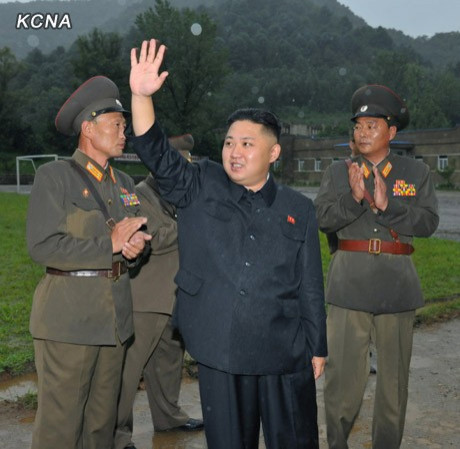North Korea And Japan Meet, But Normal Relations Still Far Away

After four years of silence, officials from Japan and North Korea are meeting for the first time.
It's not North Korea's nuclear weapons that they're talking about -- that issue would be too sensitive -- but something far less controversial in the contemporary sense: the potential return of bodies of Japanese soldiers and civilians who were buried in North Korea at the end of World War II.
The two sides are not even meeting in either of their countries, which might stir political outrage in both, but in Beijing. The latter capital, which has bickered back and forth with the Japanese government over past weeks on the status of a disputed series of small islands in the East China Sea, is now being used to establish new, if tenuous links, between Tokyo and Pyongyang.
At the same time, a Japanese civilian delegation, which arrived in in Pyongyang on Tuesday to stay for 10 days, will visit grave sites of deceased relatives, located across North Korea.
Sadao Masaki, a representative of the group travelling to North Korea, said prior to leaving for Pyongyang from Beijing that "Things have proceeded to a stage that is beyond what we had even hoped for. We are extremely grateful."
It is yet unknown whether their trip will result in any successful exhumations and returned bodies, or if it simply lays ground work for possible actions in the future.
The talks in Beijing, to last for only a single day, are also expected to be an occasion for Japan to raise the issue of its abducted citizens, kidnapped by North Korean agents and brought back to that country in the 1970s and 1980s to train intelligence operatives. Their disappearance, long unexplained, resulted in decades of grief for the affected families in Japan. The captured, who were common civilians, trained North Korean spies in language, culture, and social behavior, so that they could better hide in missions abroad.
Deceased North Korean leader Kim Jong-il apologized for the issue in 2002, and 5 of the remaining abductees were finally allowed to return to Japan.
North Korea says that it took 13 Japanese citizens, aged between 13 and 46, some with families and children. The other eight have died under different circumstances over past years. However, activists and the government in Japan say that at least 17 were taken, and assert that the 12 others remaining in North Korea are unlikely to have perished.
Japan has made the return of the abductees and disclosure of greater information on their status a condition to the normalization of relations with Pyongyang.
In 2008, before talks were frozen between the two sides over disagreements on North Korea's nuclear program, the North had said that it would further investigate the abductee issue. Unsurprisingly, amid recent tensions between the two countries, little progress has been made.
Osamu Fujimura, Japan's Chief Cabinet Secretary, told the press ahead of the Beijing meeting that officials from his government were operating "based on the principle of settling the unfortunate past and on restoring normal relations."
But North Korea is unlikely to quickly forgive and forget its historical issues with Japan, shuttering the idea that quick and dramatic progress will be made.
Pyongyang is even more pronounced than neighbors South Korea and China in its condemnations of Japan for its imperial past and early 20th century military aggression.
The Korean Peninsula was annexed by Japan in 1910, and only became independent again in 1945, after WWII. Both Koreas today portray the period as a major point of national humiliation and blast Japan for its oppression and attempts to assimilate Koreans into Japanese culture during that time.
The document which formalized Korea's integration into the then Japanese Empire, the "Korea-Japan Annexation Treaty" was signed on August 22, more than a century ago. The anniversary of the release of its stipulations to the public, on August 29, shed a more complex light on the North Korean and Japanese meetings in China.
The Korean Central News Agency, North Korea's state media group, marked the occasion by releasing two articles blasting Japan on Wednesday to its website.
KCNA said the annexation "imposed indelible sufferings upon all the members of the Korean nation." It added that Japan has recently been "behaving arrogantly, watching for a chance of reinvasion, far from making an apology and reparation for the past crimes committed against the Korean nation including sexual slavery for the Imperial Japanese Army, massacres of Koreans and plunder of Korean cultural treasures."
Like South Korea, the North claims the Dokdo islets in the Sea of Japan (which both Koreas call the East Sea) as sovereign territory. Japan disputes the area as its own, calling it Takeshima. Another KCNA article added on Wednesday that "Japan has made neither apology nor reparation for the shuddering crimes. On the contrary, it has become more frantic in distorting the past history of aggression and claiming (the) Tok Islets [Dokdo]."
Japan's own anger about the abductions has its parallel in North Korea, with the article adding that, "During the barbarous colonial rule unprecedented in history, the Japanese imperialists committed unprecedented crimes against humanity including all kinds of political persecution, economic exploitation, killing and abduction."
© Copyright IBTimes 2024. All rights reserved.





















